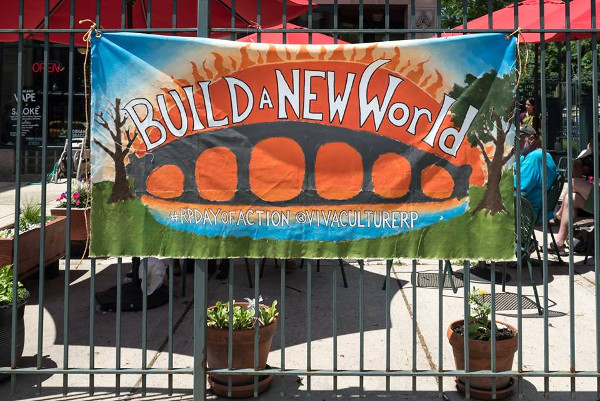
CHICAGO, IL — Since 2012, a cultural-political movement of creativity and connection has swept through Latin America. Cultura Viva Communitaria or Live Community Culture (LCC) activates art-ivists to facilitate days of action and caravans of joy where communities encounter a magnification of their own culture. LCC builds solidarity in neighborhoods across the country (and even internationally), in opposition to a worldwide systemic culture of death.
North America’s first day of action took place in Rogers Park, Chicago, on June 11, 2016. At the opening ceremony a small circle gathered under a shady grove of trees overlooking the lake. We opened with a practice of historical memory, a key component to the methodology of Live Community Culture. We told stories of what we remembered about our childhood neighborhoods. A resident of the far South Side of Chicago shared their feeling of displacement when they travel to white neighborhoods; then offered a participatory performance with their 10-year-old daughter about the inheritance of trauma through the mother lineage.
The circle dispersed to experience a day full of Rogers Park Culture, a few highlights being: a peace circle on healing violence, international residents of Rogers Park performing music and stories and a teach-in about how education budget cuts have most impacted Chicago’s Gale School.
Chicago’s archetypal culture is one of segregation and corruption. Communities are tactically isolated and the poor and Black grasp for security and visibility. Last summer, 12 community activists in Bronzeville, a predominately Black neighborhood, went on a hunger strike for 34 days. They were willing to give their lives to re-open Walter H. Dyett High School after it had been closed due to Chicago Public School (CPS) budget cuts. During their strike, CPS gave Lincoln Elementary, a school in a primarily white affluent neighborhood, a $21 million expansion. The hunger strikers protested the ribbon cutting, enraged at the double standard.
How does the working class unite to oppose the neo-liberal war machine privatizing basic needs such as school, food, water, education and health care? Without these basic needs met, our humanity is lost as we fight for $15/hr, with no time, energy, or resources to offer our children as an alternative to violence and self destruction. It becomes easy for the rich to justify to themselves and the divided masses that the poor and dispossessed are disposable.
We must remember and imagine our humanity like warriors. Our unity depends on creating a strong political and cultural opposition. Our ability to practice truth, tell stories, find joy, play music, give and receive touch and seek our own education cannot be privatized. LCC empowers artists and cultural workers to step into the spotlight as the bloodline of the united movement, encouraging each neighborhood to hear its own heartbeat. Caravans move from one neighborhood to the next diminishing borders and reclaiming public spaces as our own. As the collective heart of the people strengthens, so does the clarity of the demand for a reordering of society around the needs of the people. Viva Cultura Communitaria!
To learn more and get involved, contact Angelina Llongueras at angelina.llongueras@gmail.com, and visit livecommunityculturerp.com
